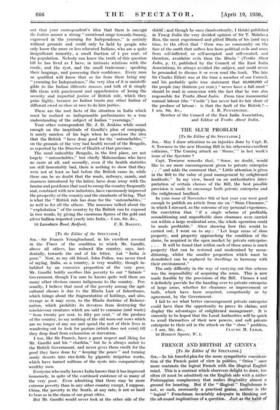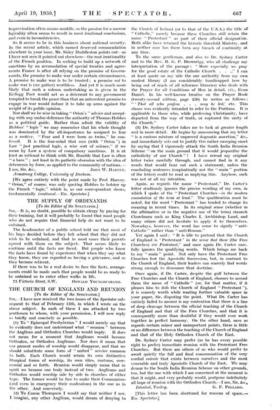FRENCH AND BRITISH AT GENEVA . . .
[To the Editor of the SPECTATOR.] . .
Sin,—In his forceful plea for the more sympathetic considera- tion of the French point of view, in politics, " Orion 7 once more contrasts the logical French with the illogical English mind. This is a contrast which observers delight to draw, too often (it must be admitted) on the English side with a rather Podsnappian complacency that makes illogicality almost a ground for boasting. But if the "illogical" Englishman is not, as such, necessarily a practical genius, neither is the "logical" Frenchman invariably, adequate in thinking out the all-round implications of a .question. ..1-nst asthe,babit 9f
improVization often means muddle, so the passion for a narrow logicality often seems to result in most irrational conclusions, and even in inconsistencies.
So it seems to be in this business about national security. In the recent article, which earned deserved commendation elsewhere in your issue, Mr. Sisley Huddleston points out—as I have not seen it pointed out elsewhere—the root irrationality of the French position. In seeking to build up a network of sanctions by an accumulation of special treaties and agree- ments France is after all relying on the promise of Govern- ments, the promise to make war under certain circumstances. A promise to make war is to be trusted ; a promise not to make war is (we gather) worthless. And yet it is much more likely that such a solemn undertaking as is given in the Kellogg Pact would act as a deterrent to any government tempted to break the peace than that an antecedent promise to engage in war would induce it to take up arms against the weight of its public opinion.
Nor shall we be wise in taking" Orion's" advice and accept- ing with any undue deference the authority of Thomas Hobbes as a political guide. Rather than admit the validity of. Hobbes' " logic " we may remember that his whole thought was dominated by the all-importance he assigned to fear as a motive. "Fear and I were born as twins," he con- fessed. It is the fear-mind that sees (with "Orion ") in Law "just practical logic, a wise sort of science," if we mean by Law a system of compulsory sanctions. It is at least as rational to think with Mr. Bumble that Law is often "a bass" ; not least in its pathetic obsession with the idea of deterrence by force, as applied to the community of nations.—
I am, Sir, &c., JOHN W. HARVEY. Armstrong College, University of Durham.
[We agree entirely with the point made by Prof. Harvey. "Orion," of course, was only quoting Hobbes to bolster up the French "logic," which is, as our correspondent shows, fundamentally irrational.—ED. Spectator.]











































 Previous page
Previous page